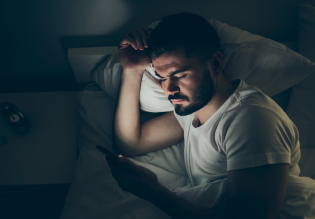Insomnia
Table of contents
- 00. Intro
- 01. What causes insomnia?
- 02. What are the symptoms of insomnia?
- 03. Types of insomnia
- 04. How can insomnia be treated?
00.
Intro
Insomnia is a common sleep disorder. It manifests in a number of different ways; difficulty falling asleep, difficulty staying asleep, or causing you to wake early and not be able to get back to sleep.
Insomnia affects millions of people worldwide and is the most common sleep disorder. It is believed that up to 30% of the adult population experiences short-term (acute) insomnia and 10% have longer-lasting (chronic) insomnia.
Short-term insomnia typically lasts for days or weeks and is typically the result of a traumatic event or unusual stress levels. Long-term insomnia can be caused by other underlying health issues and/or medications.
While the amount of sleep you need every night varies from person to person, most adults need seven to eight hours of sleep a night.
01.
What causes insomnia?
Insomnia can impact not only your energy levels and mood but also your health, work performance and quality of life.
Typically, the type of insomnia that you are experiencing is impacted by the underlying issues causing insomnia. Acute and chronic insomnia often have different triggers and causes.
The most common causes of short-term or acute insomnia include:
• Stress
• A traumatic event
• Changes to your sleeping habits
• Jet lag
• Physical pain or illness
• Medications
The most common causes of long-term or chronic insomnia include:
• Chronic pain such as arthritis or back pain
• Anxiety or depression
• Sleep apnoea
• Other underlying health conditions inc. diabetes and cardiovascular diseases
02.
What are the symptoms of insomnia?
The signs of insomnia are typically the same whether you are suffering from acute or chronic insomnia. The common symptoms of insomnia include:
• Waking up too early and being unable to get back to sleep
• Worrying that you won’t fall asleep
• Consistent periods of broken sleep
• Trouble falling asleep
As you experience difficulties sleeping, this can often lead to a series of other symptoms related to lack of sleep. These include:
• Fatigue
• Low energy levels
• Mood changes
• Difficulty concentrating
• Increased accidents/clumsiness
• Daytime tiredness
• Not feeling well rested after a night’s sleep
If you are experiencing these symptoms and they are impacting your day-to-day life, you should seek medical advice from a professional. You may be referred to a sleep specialist for further assessment.
03.
Types of insomnia
As well as acute and chronic insomnia, professionals can also break down insomnia in a few different ways depending on specific characteristics that you are experiencing. The different types of insomnia include:

Acute Insomnia
This refers to short-term sleeping difficulties that typically last no longer than a few weeks.

Chronic Insomnia
This refers to insomnia that impacts your nightly sleep for at least three days of the week on a regular basis. Chronic insomnia will usually have been ongoing for at least three months.

Onset Insomnia
If you specifically have problems falling asleep, this is known as onset insomnia. There are a number of reasons that people struggle to fall asleep but some of the most common include caffeine use and mental health issues, sometime caused by stress.

Maintenance Insomnia
If you find yourself waking up early and not being able to get back to sleep, you are likely suffering from maintenance insomnia. This type of insomnia can be caused by stress and other mental health symptoms and tends to be self-perpetuating as you lay awake worrying that you can’t get back to sleep.
04.
How can insomnia be treated?
Depending on the cause of your insomnia, there are several things you can do at home to treat insomnia.
Changing your sleeping habits, monitoring what you eat and drink before bed, reviewing any medications you might be taking or tackling things that are causing stress in your life are all ways you can look to self-treat the problems of insomnia, particularly acute insomnia.
Lifestyle changes that include meditation, acupuncture or relaxing oils can also be effective for some people.
If these measures don’t work, or you have chronic insomnia, you may need to visit your doctor or a health professional who may recommend cognitive behavioural therapy, medications or both. These can help to improve relaxation and sleep.
There are also some over-the-counter supplements that can offer some relief from insomnia for some people. These include melatonin and magnesium for sleep. You should always consult your doctor before taking any supplements as they may interact with other prescription or over-the-counter medications.
Axon can also help with...

Back Pain
Back pain is a common condition for many people and can be caused by a wide range of issues inc. damage to ligaments and muscles, discs, nerves, or vertebrae.

Neck Pain
Neck pain is a common ailment caused by several different factors inc. muscle strains, worn joints, nerve compression, injuries, diseases or muscle spasms.

Migraine
A migraine may be triggered for a variety of reasons inc. diet (some foods and alcohol), changes in hormone levels, and emotional, physical and environmental factors.

Insomnia
Insomnia is a very common sleep disorder that can sap not only your energy level and mood but also your health, work performance and quality of life.